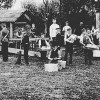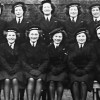In 1888 the Boys’ Brigade in Scotland was prevalent in portside cities. Glasgow (93 Companies), Edinburgh (17), and Ayr (6) were home to the largest Battalions.[1] When the movement became established south of the border this pattern was replicated. By the end of the century London was the second largest area of strength nationally […]




